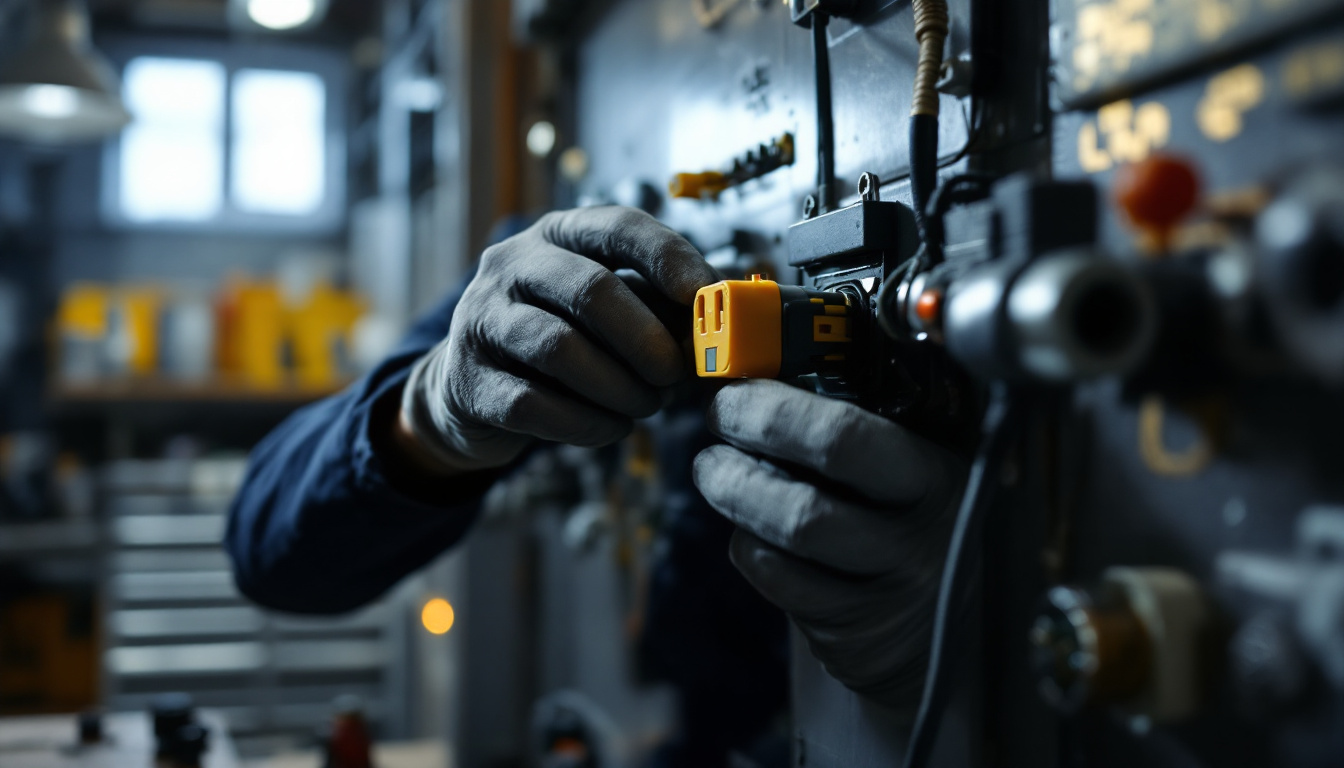
In the realm of electrical installations, lighting contractors play a pivotal role in ensuring that clients receive safe and efficient lighting solutions. One essential component that often comes into play is the fused plug. Understanding the intricacies of this device can enhance a contractor’s ability to deliver quality service while adhering to safety regulations. This article aims to provide valuable insights into fused plugs, their applications, and best practices for lighting contractors.
A fused plug is a type of electrical plug that incorporates a fuse as a safety feature. This fuse is designed to protect electrical devices from overloads and short circuits, making it a critical component in any lighting installation. By breaking the circuit when excessive current flows, the fuse helps prevent potential hazards such as electrical fires or equipment damage. The importance of using fused plugs cannot be overstated, as they serve as the first line of defense against electrical mishaps, ensuring that both users and devices remain safe.
Fused plugs consist of several key components that work together to ensure safety and functionality. The main parts include the casing, pins, and the fuse itself. The casing is typically made from durable plastic or metal, providing insulation and protection for the internal components. The pins are designed to fit securely into the socket, ensuring a stable connection. The fuse, which is often replaceable, is the heart of the plug’s safety mechanism. In addition to these components, many modern fused plugs also feature a built-in strain relief mechanism, which helps to prevent the cable from being pulled out or damaged, thereby enhancing the overall durability and safety of the plug.
Fused plugs can accommodate different types of fuses, each designed for specific applications. Common fuse ratings include 3A, 5A, and 13A, which correspond to the maximum current the fuse can handle. Selecting the appropriate fuse is crucial; using a fuse with a higher rating than necessary can defeat the purpose of having a safety mechanism in place. Additionally, there are specialized fuses available for specific applications, such as slow-blow fuses that can tolerate temporary surges in current without blowing, making them ideal for devices with motors or heating elements. Understanding the nuances of these fuse types can greatly enhance the safety and efficiency of electrical installations.
Compliance with electrical safety standards is paramount for lighting contractors. Fused plugs must meet specific regulations to ensure they are safe for use in various environments. Familiarity with local and national standards, such as those set by the Institute of Electrical Engineers (IEE) or other relevant bodies, is essential for contractors to avoid legal repercussions and ensure client safety. Furthermore, adherence to these standards not only protects consumers but also enhances the reputation of contractors in the industry. Regular training and updates on safety regulations can empower contractors to stay informed about the latest developments in electrical safety, ensuring that their installations are both compliant and reliable. This commitment to quality and safety can lead to increased customer trust and satisfaction, ultimately benefiting the contractor’s business in the long run.
Fused plugs are commonly used in a variety of lighting applications, from residential to commercial settings. Their versatility allows them to be integrated into numerous lighting solutions, providing both safety and convenience.
In residential settings, fused plugs are often used for portable lighting fixtures, such as table lamps and floor lamps. These fixtures typically require a plug that can be easily connected and disconnected from power sources. The inclusion of a fuse enhances safety, allowing homeowners to use their lighting without the constant worry of electrical faults.
For commercial applications, fused plugs are essential in installations where lighting systems are frequently used and require reliable protection. This includes office buildings, retail spaces, and event venues. The ability to quickly replace a blown fuse ensures minimal downtime and maintains the functionality of essential lighting systems.
In specialized environments, such as studios or theaters, the use of fused plugs becomes even more critical. These settings often involve complex lighting setups that demand high performance and reliability. Fused plugs provide an added layer of safety, ensuring that any electrical faults can be addressed swiftly without compromising the integrity of the lighting design.
Proper installation of fused plugs is crucial for ensuring safety and functionality. Lighting contractors must adhere to best practices to optimize the performance of these devices and prevent potential hazards.
Before beginning an installation, contractors should carefully select the appropriate fused plug for the specific application. This includes considering the power requirements of the lighting fixtures and the environment in which they will be used. Using a plug with the correct fuse rating is essential to prevent overloads and ensure compliance with safety standards.
When installing a fused plug, it is vital to ensure that all connections are secure. Loose connections can lead to arcing, which poses a significant fire risk. Contractors should double-check that the pins are firmly inserted into the socket and that the internal wiring is properly secured within the plug casing.
Regular maintenance and inspection of fused plugs are essential for long-term safety and performance. Contractors should advise clients on the importance of checking fuses periodically and replacing them as needed. Additionally, inspecting the plugs for any signs of wear or damage can help prevent potential issues before they arise.
Despite their reliability, fused plugs can encounter issues that may require troubleshooting. Understanding these common problems can help lighting contractors provide effective solutions for their clients.
One of the most common issues with fused plugs is a blown fuse. This can occur due to overloads, short circuits, or faulty equipment. When a fuse blows, it is essential to identify the underlying cause before simply replacing it. Contractors should check the connected devices and wiring to ensure there are no faults that could lead to repeated failures.
Loose connections within the plug can lead to intermittent power supply or complete failure of the lighting system. If a client reports flickering lights or devices that do not turn on, it is advisable to inspect the fused plug for any loose wiring or connections. Tightening these connections can often resolve the issue.
Physical damage to the fused plug can compromise its safety and functionality. Contractors should educate clients on the importance of handling plugs with care and avoiding exposure to moisture or extreme temperatures. If a plug shows signs of damage, it should be replaced immediately to prevent potential hazards.
Safety is paramount in any electrical installation, and the use of fused plugs is no exception. Lighting contractors must prioritize safety measures to protect both themselves and their clients.
When working with electrical installations, contractors should always wear appropriate personal protective equipment (PPE). This includes insulated gloves, safety glasses, and non-conductive footwear. Utilizing PPE minimizes the risk of electrical shock and other injuries during installation and maintenance tasks.
Contractors should take the time to educate clients about the importance of electrical safety, particularly regarding the use of fused plugs. This includes explaining how to identify signs of electrical issues, such as flickering lights or unusual smells, and encouraging them to contact a professional if they suspect a problem.
Having a clear understanding of emergency procedures is essential for lighting contractors. In the event of an electrical fault or fire, knowing how to respond quickly can save lives and property. Contractors should be familiar with local emergency services and ensure that clients are aware of how to disconnect power safely in case of an emergency.
The electrical industry is continually evolving, and fused plug technology is no exception. Staying informed about emerging trends can help lighting contractors remain competitive and provide the best solutions for their clients.
With the rise of smart home technology, the development of smart fused plugs is becoming increasingly popular. These plugs can be controlled remotely via smartphone apps, allowing users to monitor energy consumption and control lighting from anywhere. Contractors should consider familiarizing themselves with these products to meet the growing demand for smart solutions.
As safety standards evolve, manufacturers are incorporating enhanced safety features into fused plugs. Innovations such as surge protection and integrated circuit breakers can provide additional layers of protection for electrical devices. Lighting contractors should stay updated on these advancements to offer clients the most reliable and safe products available.
Environmental awareness is driving the demand for eco-friendly electrical solutions. Fused plugs made from sustainable materials and designed for energy efficiency are gaining traction. Contractors should explore these options to align with the growing emphasis on sustainability in the construction and electrical industries.
Fused plugs are an essential component in the toolkit of lighting contractors. Understanding their functionality, applications, and best practices can significantly enhance the quality of service provided to clients. By prioritizing safety, staying informed about industry trends, and addressing common issues proactively, contractors can ensure that their lighting installations are not only effective but also safe and reliable.
As the electrical industry continues to evolve, embracing new technologies and innovations will be key to maintaining a competitive edge. Lighting contractors who invest in their knowledge and skills will be better equipped to meet the needs of their clients and contribute to a safer, more efficient electrical landscape.
Ready to elevate your lighting projects with the highest quality fused plugs and lighting accessories? Look no further than LumenWholesale, where we provide lighting contractors with spec-grade products at unbeatable wholesale prices. Say goodbye to local distributor markups and hello to our extensive selection that meets rigorous industry standards. With free shipping on bulk orders, you can trust that you’re getting premium lighting at the best value, without any hidden fees. Don’t compromise on quality or cost. Visit LumenWholesale today and experience the ideal combination of quality, affordability, and convenience for all your lighting needs.

Discover the essential reasons why every lighting contractor should consider incorporating outdoor barn lights into their projects.

Discover the pitfalls lighting contractors often face with Keystone Technologies.

Discover the essential checklist for lighting contractors working with flexible LED lights.

Discover the ultimate guide for lighting professionals with our essential checklist for solar panel flood lights.